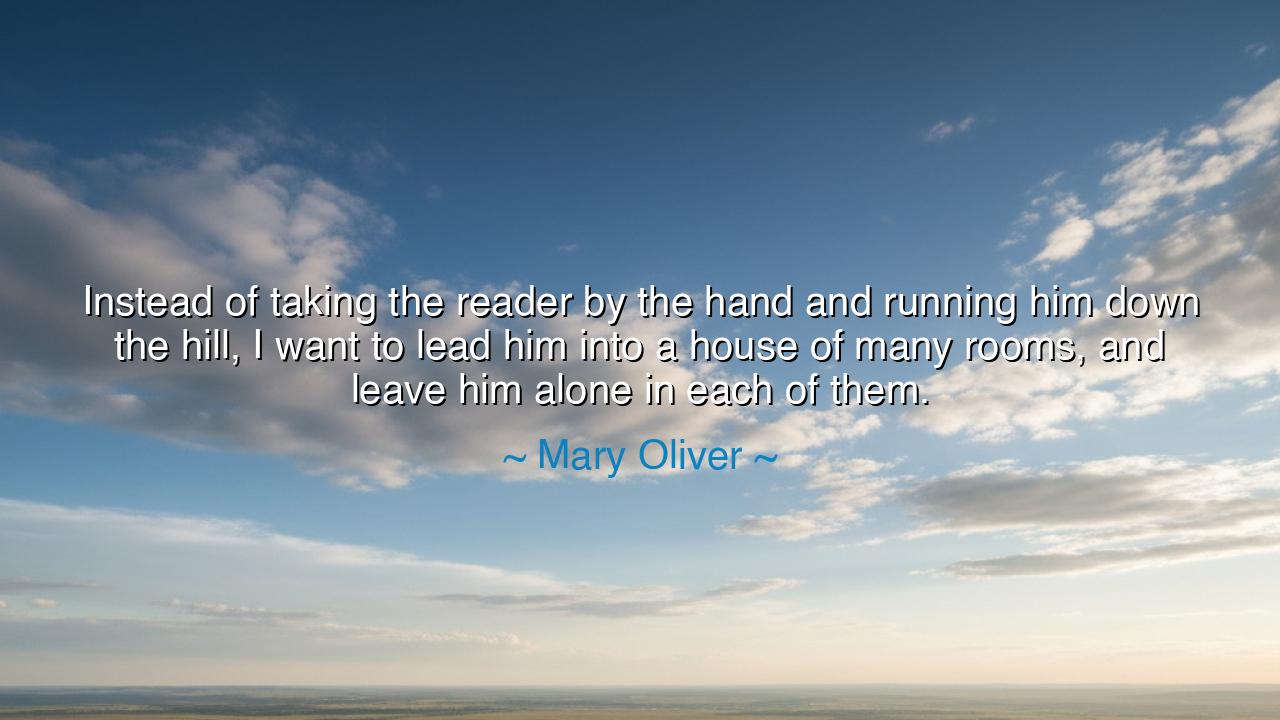
Instead of taking the reader by the hand and running him down the
Instead of taking the reader by the hand and running him down the hill, I want to lead him into a house of many rooms, and leave him alone in each of them.






In the quiet wisdom of Mary Oliver, the poet of the wild and the watcher of small miracles, we find this luminous truth: “Instead of taking the reader by the hand and running him down the hill, I want to lead him into a house of many rooms, and leave him alone in each of them.” At first, these words may seem gentle — yet beneath them lies a profound philosophy of art, understanding, and the human soul. Oliver speaks not merely of writing, but of life itself: of how we guide one another not by command or control, but by awakening within others the power to discover meaning for themselves.
To take the reader by the hand and run him down the hill is the way of those who wish to instruct, not to enlighten. It is the way of haste — of certainty that leaves no space for wonder. The hill may be beautiful, but the journey is brief, and the vision fleeting. Yet to lead him into a house of many rooms, that is the work of a true guide, a true artist, and a true soul. The house stands for the vast interior of the human spirit, filled with mysteries and doors unopened. And to leave him alone in each room — ah, that is the sacred act of trust. It is saying: “You are ready. You must look for yourself now.”
There is ancient wisdom in this. The greatest teachers of history — Socrates, the Buddha, Confucius, and the prophets of old — did not drag their students toward answers. They spoke in riddles, in parables, in questions that turned like keys in the mind. Socrates would walk the dusty streets of Athens, speaking softly, never declaring the truth but only guiding others toward it. He built no temples, wrote no treatises; instead, he opened doors within his students and then stepped back, letting them wander through the many rooms of their own thought. He knew that truth cannot be handed down — it must be discovered in silence, wrestled with, and finally embraced by one’s own soul.
So it is with Mary Oliver’s art. Her poems do not explain; they invite. She does not say, “Look, this is beauty.” Instead, she shows us a field of wild geese, a black bear, or a simple blade of grass — and then leaves us there, alone with our hearts. In that silence, the reader begins to hear the whisper of his own spirit. For the true poet does not seek to instruct the world, but to awaken it. Each poem is a doorway, each image a threshold into the infinite landscape of awareness.
This teaching holds not only for poetry but for all creation, all mentorship, all love. When you give someone every answer, you rob them of discovery. When you lead them too quickly, you deny them the joy of the journey. But when you show them where the door is, and step aside — when you trust their strength, their curiosity, their courage — then you honor the divine within them. The great sculptor Michelangelo once said that every block of marble already contained its statue, and his task was merely to set it free. So too must we treat the souls of others — not as clay to be molded, but as stone already filled with hidden form, awaiting only the gentle strike of insight.
The lesson, dear listener, is clear: in your art, in your teaching, in your love — do not seek to command understanding. Instead, build the house, open its many rooms, and let others find their own way through its corridors. Let silence do its work. Let wonder unfold like dawn across their minds. Have faith that the human heart, when left alone in the presence of truth, will not flee from it but will listen, and in that listening, grow.
In your own life, practice this sacred restraint. When you share wisdom, do not rush to finish the story. When you create, do not explain the mystery. When you guide, do not pull. Instead, point gently toward the unseen door and say, “Enter.” For it is only in solitude that understanding deepens; only in quiet that the voice of truth is heard. The house of many rooms awaits us all — vast, eternal, filled with light and shadow — and in each room, the soul learns to dwell with itself.
Thus Mary Oliver, like the poets of old, teaches us not to run but to wander, not to explain but to reveal. She reminds us that wisdom is not given; it is found. And when we dare to stand alone in the rooms of our own spirit, we discover that they are not empty at all — they are filled with the echoes of eternity.






AAdministratorAdministrator
Welcome, honored guests. Please leave a comment, we will respond soon